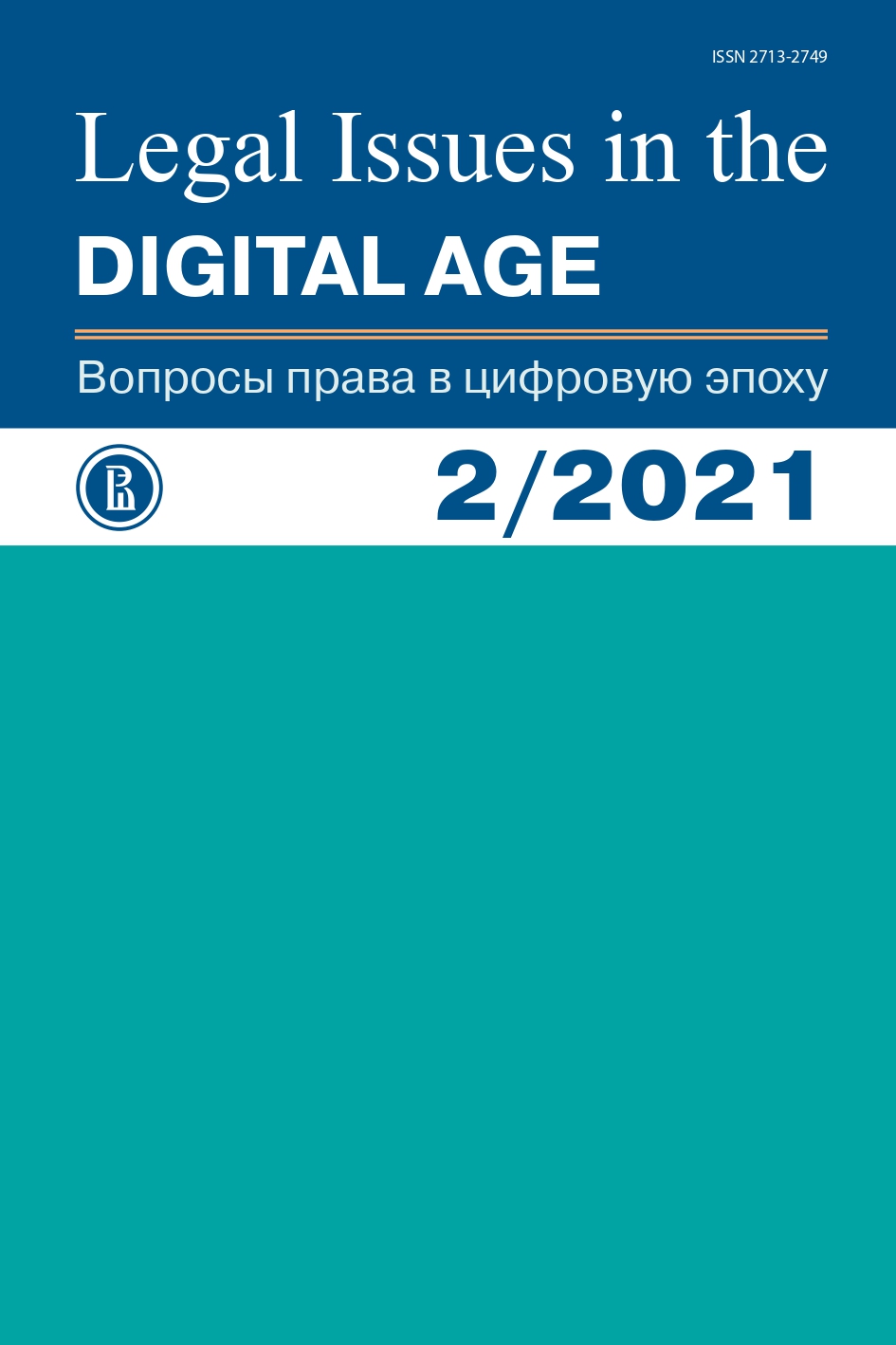Law and Digital Transformation
Abstract
The coexistence of digitization and law fuels their mutual influence and calls for scholarly inquiry into their mutual impacts and the effects thereof. Technization of society has contributed to society’s development, and the objectives and vectors of this process have been in many ways informed by public and other social institutions, including law. Like before, digitization at its current stage combines social and technological mechanisms of managing societal processes, ingrained into the wide socio-economic context and connected with the implementation of the nation’s strategic objectives. Similar phenomena and processes have a strong impact beyond Russia’s borders as well. All this poses challenges for law. The article is an attempt to analyze legal challenges of digitization applying the method of comprehensive, intersectional and systemic analysis, which breaks down the excessive compartmentalization of sector-specific legal sciences and takes into account the relationship between national and international law, as well as advances in other social sciences. The new digital technologies transform law’s functionality, and this, firstly, is reflected in the dynamically developing sector-specific legislation, and secondly, adds a distinctive dimension to the new laws and regulations of general character that create the basis for digitization. Digitization transforms the way subjects of law operate and the volumes of legal relations between them; generates new forms of administrative decision-making and of liability for non-implementation
of these decisions; problematizes the subject area of the legal nature of technical (electronic) legal acts and the place they occupy in the legislative and regulatory framework; highlights the issue of the potential and limitations of automation of law. The study leads the researchers to conclude that in the age of digital transformation of economy, social sphere and public administration, law steadily continues to function as the regulator of socio-economic and other processes in society, ensuring both stability and the necessary transformational activities of individuals and public institutions.
References
Аrtyukhin R.E., Povetkina N.A. (eds.) (2021) New institutions of budgetary law and digital revolution. Moscow: Norma, 192 p. (in Russian)
Bogolyubov S.А. (2020) The development of environmental law in Eurasia. Мoscow: INFRA-М, 432 p. (In Russian)
Düwell M., Rehmann-Sutter Chr., Mieth D. (2008) The Contingent Nature of Life: Bioethics and Limits of Human Existence. Heidelberg: Springer, 373 p.
Engels F. (2019) AntiDühring. Moscow: AST, 480 p. (in Russian)
Haraway D. (2017) A Cyborg Manifesto. Moscow: Ad Marginem Press, 128 p. (in Russian)
Hochberg L., Cochrane T. (2013) Implanted Neural Interfaces. Ethics in Treatment and Research. In: Neuroethics in Practice. Medicine, Mind, and Society. Chatterjee A., Farah M. (eds.). Oxford: University Press, 290 p.
Khabrieva T.Y. (2016) La réforme constitutionnelle dans le monde contemporain. Moscow: Nauka, 223 p. (in French)
Lebedev V.M., Khabrieva T.Y. (ed.) (2019) Justice in the Modern World. Moscow: Kontrakt, 688 p. (in Russian)
Pilipenko A.N. (ed.) (2021) Trends in digitalizing executive power in foreign countries. Moscow: Infotropik, 232 p. (in Russian)
Schwab К. (2016) The fourth industrial revolution. Moscow: Eksmo, 400 p. (in Russian)
Rayfuse R. (2017) Public International Law and the Regulation of Emerging Technologies. In: The Oxford Handbook of Law, Regulation, and Technology. Brownsword R., Scotford E., Yeung K. (eds.) Oxford: OUP, pp. 500–522.
Sinitsin S.A. (2020) Russian and foreign civil law in the conditions of robotics and digitalization. A case of interdisciplinary research. Moscow: Infotropik, 212 p. (in Russian)
Stepanenko D. (2016) With a wave of thought. Populyarnaya mekhanika, no 2, pp. 26–27 (in Russian)
Таlapina E.V., Yuzhakov V.N. et al. (2020) Data circulation in state management: perspectives of legal regulation. Moscow: Delo, 244 p. (in Russian)
Tadeusiewicz R., Rotter P., Gasson M. (2012) Restoring Function: Application Exemplars of Medical ICT Implants. Human ICT Implants: Technical, Legal and Ethical Considerations. The Hague: Springer, 186 p.
Yudin B.G. (2011) Borders of human existence in the world of new technology. Working papers on bioetik. Moscow: Gumanitarniy universitet press, pp. 4–22 (in Russian)
Authors who publish with this journal agree to the Licensing, Copyright, Open Access and Repository Policy.










